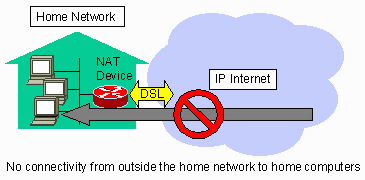
| What Is AVES? |
AVES (Address Virtualization Enabling Service) is a research project at the Department of Computer Science of Carnegie Mellon University, initiated by Ph.D. student Eugene Ng together with Prof. Hui Zhang of CMU and Prof. Ion Stoica of UC Berkeley. Its goal is to solve one of the most serious problems in the Internet today -- connecting hosts without IP addresses (or, more precisely, globally unique IPv4 addresses).

The rapid growth of the Internet has made IP addresses a scarce resource. The effect has been felt even by the average consumers. For example, today, DSL or cable modem service typically comes with only a single IP address for the entire household. When more than one host requires Internet access, a scheme called Network Address Translation (NAT) or IP Masquerading is commonly used to share the Internet connection. NAT is widely available in many products on the market, some examples are Windows 98, Windows 2000, Linux, WinGate, etc.

Unfortunately, what many people do not know is that using NAT, hosts that are sharing the Internet connection are not first class network entities. While these hosts can connect to Internet hosts outside the home network, Internet hosts outside the home network cannot connect to them (i.e. no general in-bound connectivity). Although some partial work-arounds such as manually configured port forwarding are possible, they do not provide general in-bound connectivity (see our paper for a discussion on the existing work-arounds). Connectivity is therefore uni-directional. Consequently, many applications such as remote login, web serving, file sharing, to name a few, become impossible. Recent interest in peer-to-peer applications such as Napster has raised the awareness of this problem because peer-to-peer applications require bi-directional connectivity to work correctly.
Some people believe that IPv6 will solve this problem eventually because there are more than enough IPv6 addresses to go around. Perhaps. However, before the entire Internet is upgraded to IPv6, IPv6 suffers from the exact same problem since without getting IPv4 addresses to dual-stack IPv6 hosts, NAT will be the key technology to connect IPv6 networks to the IP Internet. Thus, the connectivity between IPv6 hosts and the IP Internet will mainly be uni-directional.
AVES restores bi-directional connectivity to hosts that do not have IP addresses. To enjoy this benefit, a NAT user simply needs to sign up for the AVES service with a service provider and upgrade his NAT software. Unlike other known solutions, AVES can provide general connectivity and does not require any change to existing IP hosts or IP network routers. This is extremely important because owners of existing IP hosts and IP network routers have no incentive to upgrade their equipments to achieve connectivity to NAT users.